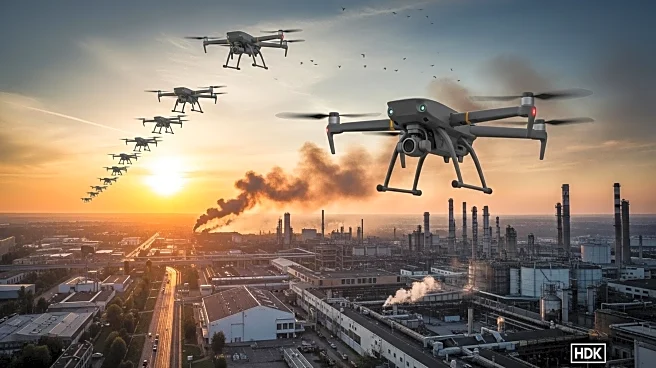What is the story about?
What's Happening?
Ukraine's strategic targeting of Russian oil refineries through drone strikes has significantly disrupted Russia's gasoline production capabilities. According to Seala, a Russian energy markets analysis agency, nearly 40% of Russia's refining capacity is currently idle, primarily due to damage from these attacks. This has resulted in a 20% shortfall in the country's monthly gasoline demand, forcing Russia to increase imports from Belarus and consider eliminating import duties on gasoline from countries like China, South Korea, and Singapore. The Russian government has extended a ban on gasoline and diesel exports to manage domestic shortages, particularly affecting regions like Crimea. The economic strain is compounded by a budget deficit projected to reach 2.6% of GDP in 2025, driven by reduced oil and gas revenues.
Why It's Important?
The disruption in Russia's gasoline production has broader implications for its economy and military operations. The need to import refined products and the extension of export bans indicate significant vulnerabilities in Russia's energy sector, which is crucial for its economic stability. The financial strain is further exacerbated by increased military spending, which has overshadowed social spending. This situation could lead to heightened social tensions within Russia as citizens face higher taxes and reduced social services. Additionally, the economic pressure on Russia could influence its military strategies and its ability to sustain prolonged conflict, potentially impacting geopolitical dynamics in the region.
What's Next?
Russia may continue to seek alternative sources for gasoline imports and explore chemical additives to boost supply. The government is likely to face increasing pressure to balance military expenditures with domestic economic needs. Internationally, Ukraine's continued use of drone strikes on Russian energy infrastructure could further destabilize Russia's economy, potentially leading to shifts in its military strategy. The situation may also prompt responses from global energy markets, as disruptions in Russian oil production could affect global supply and prices.
Beyond the Headlines
The ongoing conflict and economic strain highlight the ethical and strategic complexities of warfare that targets critical infrastructure. The use of drones to disrupt energy supplies raises questions about the long-term impacts on civilian populations and the environment. Additionally, the economic measures taken by Russia, such as tax increases and reduced social spending, reflect broader challenges in balancing national security with economic stability. These developments could lead to shifts in public sentiment and policy within Russia, influencing its domestic and foreign policy decisions.
















